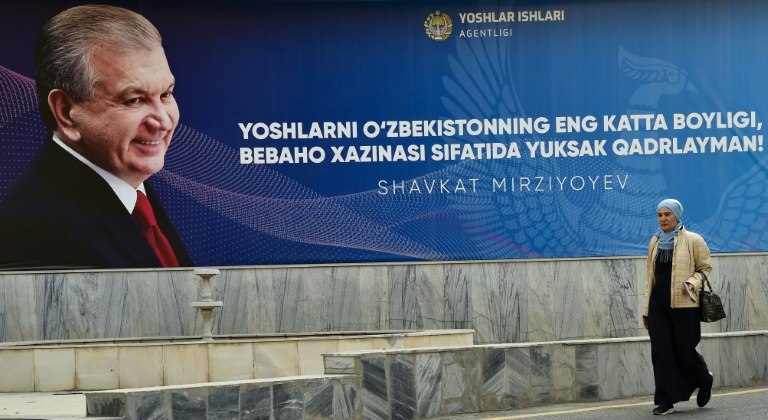Uzbekistan’s President Shavkat Mirziyoyev is credited with leading Central Asia’s most populous country out of isolation, but his appetite for change may be waning now that he has consolidated power.
The 64-year-old is expected to sail past four token candidates on Sunday for a second five-year term in the ex-Soviet country whose neighbourhood includes a rising China, resurgent Russia and Taliban-controlled Afghanistan.
Mirziyoyev’s reforms — including ending infamous forced labour in the cotton industry — have been hailed both by long-suffering citizens and foreign observers.
His hardline mentor and predecessor Islam Karimov, who died in 2016 after ruling for more than a quarter of a century, set a low bar, having gained a reputation for torturing opponents, including by boiling and freezing them.
Despite changes since Karimov’s death unthinkable under his tenure, Mirziyoyev’s critics say some recent moves carry echoes of the country’s despotic past.
“Uzbekistan’s political system is still deeply authoritarian,” Human Rights Watch said this month ahead of the vote.
“Since the start of the year, promised human rights reforms have stalled, and in particular in the months leading up to the presidential election, there has been clear backtracking in some areas”.
Mirziyoyev, an energetic grey-haired man, loosened the straitjacketed economy to trade, tourism and foreign investment after taking over power in the 34-million strong republic.
Ties with neighbouring Kyrgyzstan and Tajikistan — countries Karimov once threatened with war over hydropower projects — have improved.
Mirziyoyev has advocated pragmatic ties with the Taliban, while trade with Russia and China has grown, even if he has stopped short of rejoining a Moscow-led security bloc.
His tenure has also seen controls loosened over Islam — followed by more than 90 percent of the population but viewed with suspicion by Karimov, whom critics accused of tapping the “war on terror” to repress devout Muslims.
– Free speech crackdown –
Mirziyoyev’s most celebrated achievement has been his clampdown on forced labour in the cotton fields, where wages for up to two million pickers have increased year-on-year.
Authorities hope Western firms will now end a long-standing boycott after the International Labour Organization heralded the end of systemic child labour and forced labour.
Elsewhere there is more continuity than change, critics argue, suggesting Mirziyoyev might not be the man to totally overhaul Uzbekistan’s reputation as a rights abuser.
A crackdown on critical bloggers, one of whom was sentenced to six and a half years in jail earlier this year, shows there are still plenty of red lines in a country where insulting the president is a criminal offense.
Mirziyoyev meanwhile boasted during a recent working trip to the eastern Fergana Valley region that under him, Uzbeks had learned to “live free, without fear”.
The public prominence of the eldest of his two daughters, Saida Mirziyoyeva, 36, who held a post in the state communications agency until last year, has drawn comparisons with Karimov’s eldest daughter, Gulnara Karimova.
Karimova, referred to as a “robber baron” in leaked US diplomatic cables, is currently jailed on embezzlement and criminal conspiracy charges after falling foul of her father’s regime while he was still alive.
Mirziyoyev was born in 1957 in the east of Soviet Uzbekistan.
After studying agricultural engineering, he became a deputy in the legislature aged just 32 and was later entrusted with a series of governorships under Karimov.
In that role, Mirziyoyev was at the heart of a system that saw civil servants, medics, teachers and even children dispatched to the fields to fulfil government cotton quotas.
As prime minister from 2003, Mirziyoyev was charged with running a tightly controlled economy that confounded outsiders.
His role as heir apparent quickly became clear, as he took control of Karimov’s funeral arrangements and outmanoeuvred the head of Uzbekistan’s notorious security service, Rustam Inoyatov, to become leader.
Mirziyoyev finally dismissed his rival at the beginning of 2018, paving the way for an opening of Uzbekistan that included visa-free entry for scores of countries and the end of exit visas for its own citizens.










